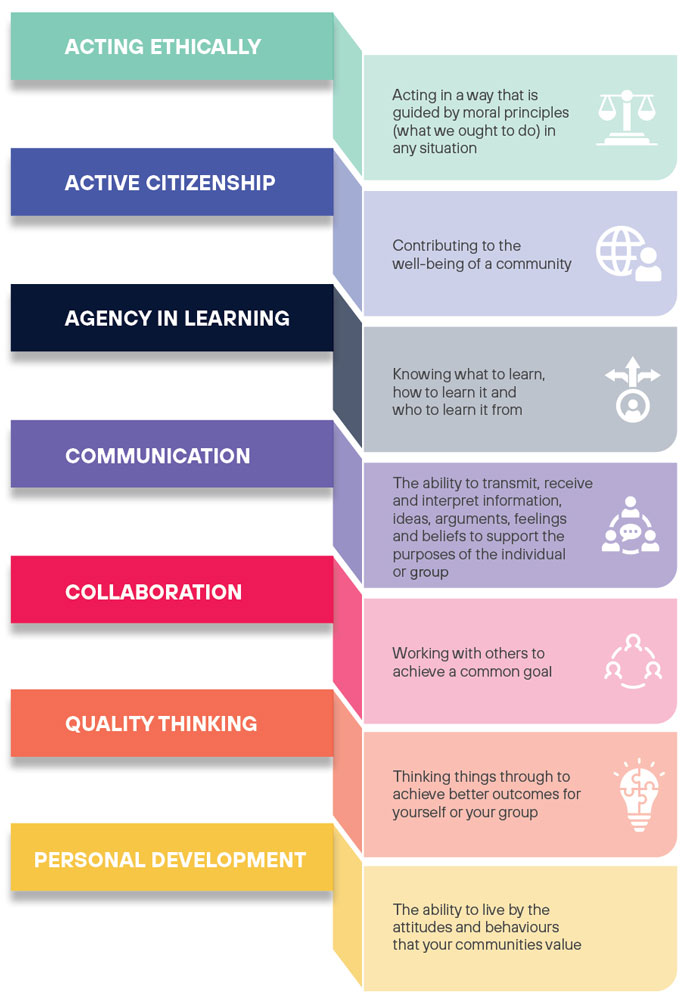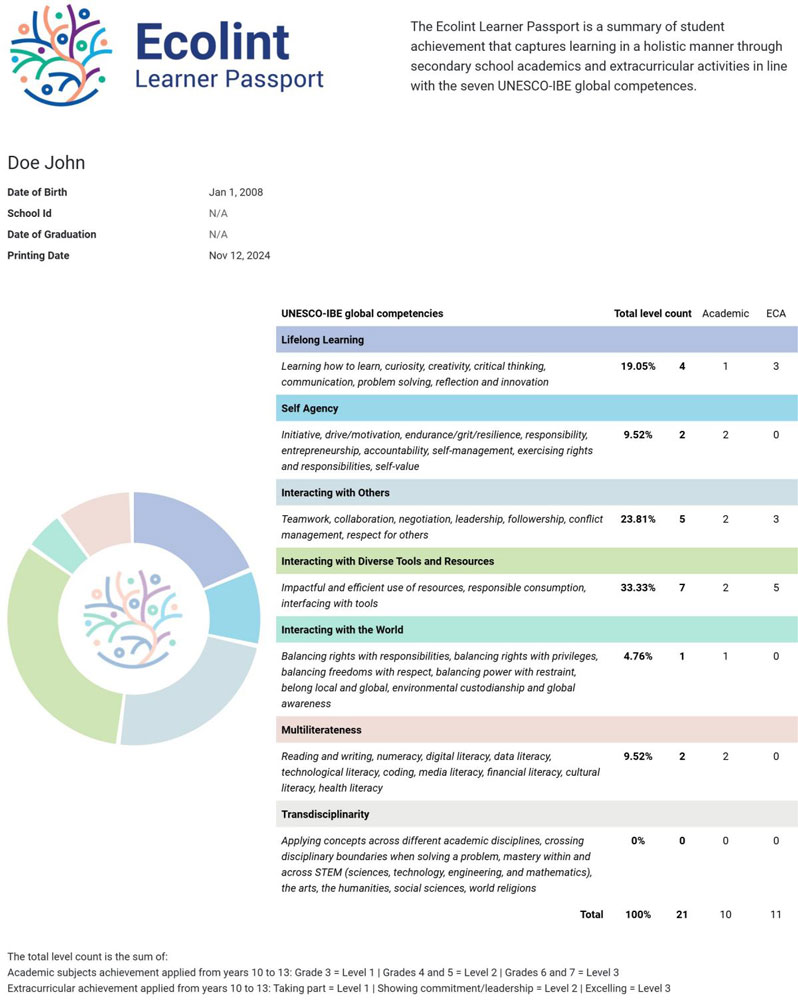
The Coalition to Honour all Learning (Ecolint) published a Call for Education Systems Reform in Spring 2024. This is one in a series of articles highlighting efforts to shape the educational landscape in such a way that reform is more likely.
Sometimes a good place to start is at the end. If our goal is reshaping secondary education, the end is graduation and, often, admittance to a university or additional program. That process requires presenting your track record.
The Transcript
Therefore, an attractive and understandable transcript is important. What is reported on that transcript is significant because it not only informs the future, but it has also wielded tremendous influence in the past, helping to determine what was taught. If what is reported is largely restricted to academic achievement in a few content areas, then academic achievement in content areas will rule the curriculum.
The folks at the Mastery Transcript Consortium (MTC) are well-known leaders in rethinking the secondary transcript to pave the way for progressive changes in secondary and primary programs. In 2015, Scott Looney, Head of the School, brought the idea to the Board of Trustees at the Hawken School. Looney put it this way, “That 99 percent of the high school transcripts follow an identical format is a vestige of an outdated industrial age.” Looney thought the high school transcript was “a boulder in the way of high school innovation” (website). MTC now claims that its transcript is currently accepted by 370 higher education organizations.
There are other initiatives to revise the high school transcript, this “most basic document” that has such a powerful washback effect. We highlight two of them this month, presented by those most familiar with them. Ellen Heyting writes about Melbourne Metrics and Irina Lupu about the Learner Passport of the International School of Geneva. In our next article, we will hear from representatives of The Global Citizen Diploma and the Innovation Diploma.
Transforming Assessment, Credentialing, and Recognition of Complex Learning Competencies
Our team at Melbourne Metrics, at The University of Melbourne, has developed a suite of tools to measure complex competencies in order to provide new metrics of success and broaden our view of learners. By tackling the interface between secondary and tertiary education - the reports created in high school for evaluation by universities - we aim to make it easier for educators to foster the competencies they need to thrive at school and beyond.
For the past 15 years, we have collaborated with schools, education systems, and other organizations in research-practice partnerships, focusing on traditionally “difficult to assess” areas of learning. Based on our longitudinal evidence, we believe that we can report complex competencies such as agency in learning, collaboration, acting ethically, and quality thinking in a valid and reliable manner. Melbourne Metrics draws from a common underlying architecture, which makes them applicable beyond any one curriculum. This curriculum-agnostic approach allows us to produce standards-based, matched credentials that universities and post-schooling stakeholders can trust and utilize for the purpose of selecting future students.

By assessing, recognizing, and credentialing learners’ competencies, we hope to contribute to a wider paradigm shift in education in several ways. Firstly, our approach supports a more holistic view of student achievement that goes beyond traditional academic grades. It encourages schools to teach for and assess a broader range of transferable competencies. Secondly, Melbourne Metrics provides tools and resources for educators to build their capacity to lead new assessment practices, thereby fostering a culture of agency and innovation in teaching, learning and assessment. Furthermore, agency in learning is at the heart of our approach. Our framework helps educators collaborate with students as authentic partners in their learning. We aim to move the student’s role from the consumer of teaching to the producer of their own learning, while not disadvantaging them when it comes to university selection. In fact, we believe Melbourne Metrics adds value in both directions: universities and other programs get richer information about potential students, and those students get a richer education because of a selection process that privileges learning that really matters.
By redefining what we value in schools and how we measure success, our approach paves the way for a more adaptive, responsive, and inclusive educational ecosystem. It champions the development of well-rounded young people, equipped not only with academic knowledge but also with the skills and competencies necessary to navigate and contribute to an ever-evolving world.
While there is an increased focus on competence-based learning in education systems around the world, the path to higher education and adulthood is still paved by high-stakes, grades-focused testing that fail to showcase the true potential of an individual. By highlighting grade-based achievement in a limited number of academic disciplines, the traditional end-of-school certificates are designed to make it easy for the reader (admissions counselors or employers) to quickly (and often incompletely) assess a student’s range of capabilities.
To tackle this problem, Ecolint reformed its high school transcript in 2021 to more broadly showcase student learning through the seven global competencies of the United Nations Educational, Scientific and Cultural Organization - International Bureau of Education (UNESCO-IBE) over the last four years of secondary school. Through the Learner Passport, Ecolint recognizes learning that happens both inside (academics) and outside (extracurriculars) the classroom and offers an inclusive experience to those young individuals who are gifted in ways that traditional assessments do not capture.
We care for the wellbeing of students by recognizing each student as a whole being, not just an academic being, and value learning wherever it may happen. Our goal is to improve the relationship between educators in the school and their students by knowing them as unique, interesting individuals. The donut chart representation of the student competence profile shifts the focus away from ranking students. Students are given the opportunity and the tools to reflect on themselves without the pressure of performing equally in all areas. Each individual is a whole person with strengths and predispositions.

Ecolint student competencies profile. The Ecolint Learner Passport is based on the UNESCO-IBE seven global competencies framework designed with the objective of equipping individuals for an ever-changing reality. (Photo source: Ecolint)
To date, more than 800 students have graduated with an Ecolint Learner Passport. At the moment, year 10 to year 13 students at Ecolint are documenting their own Learner Passports and, implicitly, reflecting on their overall learning journey in terms of competence development. Our current aim is to develop partnerships with schools around the world and expand the adoption of the Ecolint Learner Passport. Only by joining forces will we be able to generate change and make a positive impact on the way students are assessed by focusing on what we truly value.
The next article will highlight two additional organizations working to pave the way for more progressive education practices through reforming transcripts and school leaving documents. Stay tuned for current updates on the Global Citizen Diploma, based in Hong Kong, and the Innovation Diploma, based in Hungary.
Ellen Heyting is the International Networks and Credentials Lead at Melbourne Metrics at The University of Melbourne. She has over a decade of teaching and leadership experience in K-12 IB World Schools in Melbourne, Beijing, Singapore and Helsinki, and is a member of the IB Educators Network (IBEN). Her doctorate focused on the power of a sense of belonging to increase academic completion rates of students from marginalised backgrounds in international schools. Ellen continues to research in the international school context, exploring the assessment of complex competencies, international school teacher identity, and motivation and interdisciplinary learning. In her role, Ellen also supports schools with professional learning, coaching, and research-practice partnerships.
Irina Lupu is the Ecolint Learner Passport lead at the International School of Geneva (Ecolint).
Paul Magnuson founded the educational research program at Leysin American School and teaches international education at Moreland University. He is a frequent TIE blogger.